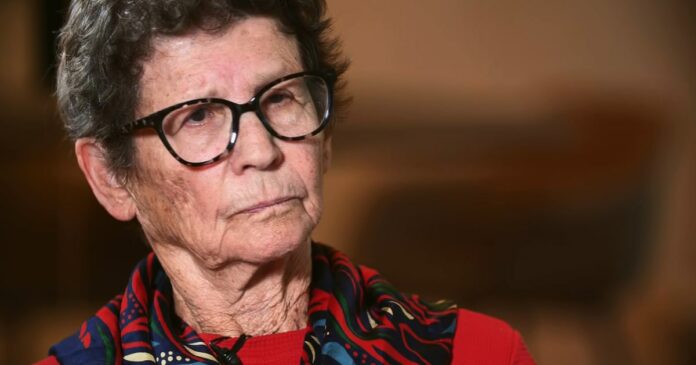TEL AVIV — Yocheved Lifshitz, one of the first Israeli hostages released by Hamas, took the world by surprise in late October when she shook the hand of one of her captors and uttered a single word: “Shalom” — a Hebrew salutation meaning “peace.”
Now, in an exclusive interview, Lifshitz said she believes peace can only be achieved once those who are still held captive are freed.
That includes her husband, Oded Lifshitz, who was also kidnapped from their kibbutz, Nir Oz, on Oct. 7.
“Time is running out,” Lifshitz, an 85-year-old peace activist who was released on Oct. 23, told NBC News’ Richard Engel on Monday.
“They need to get out today. Otherwise, they won’t survive,” she warned.
‘They just won’t make it’
Lifshitz described the harrowing conditions in which she was held for more than two weeks, painting a dismal picture of what the remaining hostages could be facing.
“The lack of air in the tunnels, as well as the shortage of food and medicine, could bring people to complete exhaustion,” she said. “And they just won’t make it.”
Living with the sound of constant bombardment above ground was a terror of its own, Lifshitz said.
The journey into Gaza, she added, was also horrifying: Lifshitz was driven across the border on the back of a moped, lying on her side, as “crowds on the way, just like a swarm of locusts … beat me with sticks.”
She was led through a tunnel system, she said, and later recognized friends from her kibbutz and elsewhere as they gathered in a large room that appeared to have been “prepared in advance.”
Read more on this story at NBCNews.com and watch “NBC Nightly News with Lester Holt” tonight at 6:30 p.m. ET/5:30 p.m. CT.
Lifshitz’ daughter, Sharone Lifschitz, who spells her surname differently from her parents, accompanied her mother for the interview. Both said they were afraid that if hostages aren’t freed before the winter holidays end, global interest in their plight — and pressure on Hamas to release them — might wane.
“Hostage families feel strongly that this week is the most crucial week,” Sharone Lifschitz said. “If it doesn’t happen this week, then it is Christmas, and then the New Year, and most of them will be dead.”
Fears for the safety of the remaining captives have mounted after the extended cease-fire — a deal that saw the release of more than 100 hostages held in Gaza and 240 Palestinian prisoners held in Israeli jails — ended on Dec. 1.
On Sunday night, Israel released the names of 20 hostages it believes are dead, heightening concerns for the more than 130 it says are still held by Hamas.
‘ I don’t know if he will be able to hold on’
Lifshitz said her 82-year-old husband, Oded, was injured in Hamas’ Oct. 7 ambush and is suffering from high blood pressure and lung disease. She fears he and other hostages with health conditions could die soon if they are not released.
“Oded suffered highs and lows in blood pressure, and he has a pre-existing lung illness, and I don’t know if he will be able to hold on over there,” she said. “The conditions over there, with no fresh air and after such a long period of time — I don’t know if there is enough oxygen over there for people with lung disease.”
In a few instances, Lifshitz referred to her husband, a journalist and fellow peace activist, in the past tense, then caught herself.
“He was a brilliant journalist, very much appreciated,” she said. “He is still — I don’t want to say ‘was’ in the past tense.”
Lifshitz said her husband, like her, dedicated most of his life to promoting peace and the goal “that every person would find his place in this world — and that there would be no wars.”
“Today I don’t have my partner, a man whose whole life fought for peace and equality,” she said. “We don’t know where he is and what happened to him.”
Lifshitz said she couldn’t speculate on what her husband would feel about the war. Around 1,200 people have been killed in Israel, according to Israeli officials, and more than 18,000 in Gaza, according to Palestinian health officials.
“One of the most important things is to reach an agreement” involving the hostages’ release, Lifshitz said, “and that there will be peace in the region.”
Qatari Foreign Minister Sheikh Mohammed bin Abdulrahman Al Thani has said the country is still trying to push negotiations about the hostages forward, despite a recent breakdown in talks.
Lifshitz said she believes those discussions are the best chance Israel has to free more captives: “It is the only thing that can save some of them who are still alive,” she said. “Only a negotiation can release and return them.”


